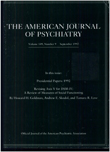A prospective comparison of four insanity defense standards
Abstract
OBJECTIVE: Controversy about the formulation of the insanity defense has been intense, but little empirical work is available regarding how different standards affect court findings. The major aims of the present study were to determine if different standards for determining insanity produced different judgments and to provide a broad descriptive picture of those cases in which the standards appeared to make a difference. METHOD: Four forensic psychiatrists were asked to indicate whether they thought 164 defendants met any or all of four insanity tests: 1) the American Law Institute (ALI) cognitive criterion, 2) the ALI volitional criterion, 3) the APA test, and 4) the M'Naghten rule. RESULTS: The four psychiatrists determined that 97.5% of the defendants met the ALI volitional criterion, 73.9% met the APA criterion, 70.3% met the M'Naghten rule, and 69.5% met the ALI cognitive criterion. Nearly two-thirds of the defendants met all four insanity tests, and 24.4% met only the ALI volitional test. Few defendants met cognitive tests without also meeting the ALI volitional test. Elimination of the volitional test for insanity reduced the rate of psychiatric recommendations of acquittal by 24.4%. CONCLUSIONS: These findings highlight the fact that the primary logical division between volitional and cognitive standards appears to be powerful but that distinctions between types of cognitive standards are not terribly powerful. In addition, the variation among individual raters must be viewed as an important determinant of how any insanity standard is applied.
Access content
To read the fulltext, please use one of the options below to sign in or purchase access.- Personal login
- Institutional Login
- Sign in via OpenAthens
- Register for access
-
Please login/register if you wish to pair your device and check access availability.
Not a subscriber?
PsychiatryOnline subscription options offer access to the DSM-5 library, books, journals, CME, and patient resources. This all-in-one virtual library provides psychiatrists and mental health professionals with key resources for diagnosis, treatment, research, and professional development.
Need more help? PsychiatryOnline Customer Service may be reached by emailing [email protected] or by calling 800-368-5777 (in the U.S.) or 703-907-7322 (outside the U.S.).



